De Griekse dichteres Maria Polydouri werd geboren op 1 april 1902 in Kalamata. Zie ook mijn blog van 1 april 2007 en ook mijn blog van 1 april 2008 en ook mijn blog van 1 april 2009 en ook mijn blog van 1 april 2010.
To a young man who committed suicide
A spirit kept pursuing him
in the dark expanses of his life.
His occupations, his joys at a nod
became pretexts of his vital drive.
His lovely books, thought, a momentary haunt.
His love a violent sight.
Later his face filled with mystery
and nothing around him was right.
A curious stranger, he wandered among us
in altered mien and grim.
He did not gainsay our suspicion
that something frightful awaited him.
He was strangely handsome, like those
whom death had singled out.
He yielded to the direst dangers
as if something guarded him throughout.
One morning, in a walnut casket we
found him dead with a mark on the temple.
All of him was like a victory,
like light casting around him in the dark.
He had such simplicity and serenity,
a smiling form living again!
As if all of him had become a Eucharist
and the cause had marked him in vain.
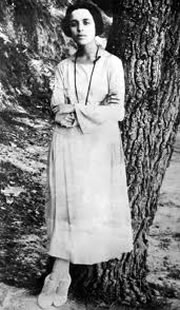
Maria Polydouri (1 april 1902 – 30 april 1930)
De Engelse journalist en schrijver Edgar Wallace werd geboren in Greenwich op 1 april 1875. Zie ook mijn blog van 1 april 2009 en ook mijn blog van 1 april 2010.
Uit: King Kong (samen met Merian C. Cooper)
„Even in the obscuring twilight, and behind the lightly floating veil of snow, the Wanderer was clearly no more than a humble old tramp freighter. The most imaginative, the most romantic eye could have detected nowhere about her that lean grace, those sharply cleaving contours which the landsman looks for in a craft all set to embark upon a desperate adventure.
For the likes of her, the down-at-heels support of the Hoboken pier was plenty good enough. There, with others of her kind, she blended into the nondescript background of the unpretentious old town: she was camouflaged into a comfortable nonentity. There she was secure from any embarrassing comparison with the great lady-liners which lifted regal and immaculate prows into the shadows of skyscrapers on the distant, Manhattan side of the river.
Her crew knew that deep in her heart beat engines fit and able to push her blunt old nose ahead at a sweet fourteen knots, come Hell or high water. They knew too that surrounding her engines, and surrounding also that deep steel chamber which puzzled all of them and frightened not a few, was a staunch and solid hull. Landsmen, however, drawn to the waterfront by that nostalgia which ever so often stirs those whose lives are bound by little desks and brief commuter train rides, looked over her rusted, scaling flanks and sputtered ignorantly:
“Lord! They don’t call that a sea-going craft, I hope!”
Weston, though he had taxied to the waterfront bent upon a business in which nostalgia had no part, said exactly that and drew back the hand which had been about to pass over the fare from Forty-second Street and Broadway. After all, if he had mistaken the pier, it would be a foolish extravagance to let this pirate on wheels knock down his flag and so gain the right to add an extra fifteen cents to the return charge“.
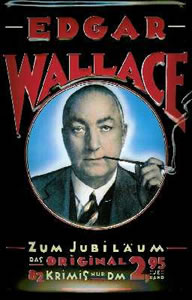
Edgar Wallace (1 april 1875 – 10 februari 1932)
De Nederlandse schrijver Arnold Aletrino werd geboren in Amsterdam op 1 april 1858. Zie ook mijn blog van 1 april 2009 en ook mijn blog van 1 april 2010.
Uit: Zuster Bertha
„In het witte morgenlicht sliep de operatiekamer, voortdommelend onder het zachte suizenvan den waterketel, die in den hoek, boven een blauwgrijze gasvlam, rustig borrelde.
Op de groote, breede tafel tegen het gele beschot, stond een lange rij zwarte flesschen, met vierkante, glanzende glimplekjes schuin op de buiken, van het venster aan de overzij, een lange, rechte lijn trekkend met haar blauwe kapjes tegen den muur. Twee groote verband-trommels stompten, met hun mat-blauwigen schijn, vierkant op van het glanzend, zinken tafelblad. In een krieuwelig, onbewegelijk gedwarrel stonden kleinere fleschjes en glaasjes doorelkaâr met een scherpe opvlekking van een rood etiket of de gele dikke streping van een fleschje jodoformpoeder, afbrokkelend van de donkere flesschenrij. Een groote flesch watten vlekte helder, alleen, hoog-op aan een der tafelhoeken, van onder goudbewasemd door een geelkoperen bekken er naast.
In lange, gebogen rijen achter elkaâr, stonden de houten stoelen, poot aan poot, wezenloos met den open hoek van de zitting en de leuning, in groote kringen uitwijdend naar het midden. Schuin daarover, wegduisterend tegen den grijs-geschilderden muur, staarde de instrumenten-kast, met haar groote, halfglazen deuren in de ruimte, korte goud- en zilverschijntjes uitblazend van de instrumenten, die op de planken schemerig wegdoezelden.
In het midden van de kamer stond de operatietafel, hoog opgeschroefd, met de zware, logge witheid der lakens, plomp, alleen, breed en dood.
En in de onbewegelijke stilte sprankte telkens een geel-oranje vonkje op in de blauwe gasvlam, even spattend met een kort knapje of floot de waterketel een kort, zingend geluidje in de beweginglooze lucht.
Zuster Bertha kwam binnen, met een breede uithoeking der deur. In de drijvende stilte liep ze zacht naar de verband-tafel, rondziende naar de stoelen en naar de kachel.“
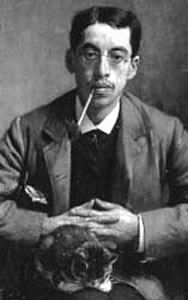
Arnold Aletrino (1 april 1858 – 17 januari 1916)
De Engelse dichter en schrijver John Wilmot, 2e graaf van Rochester . werd geboren in Ditchley, Oxfordshire, op 1 april 1647. Zie ook mijn blog van 1 april 2009 en ook mijn blog van 1 april 2010.
To This Moment a Rebel
To this moment a rebel I throw down my arms,
Great Love, at first sight of Olinda’s bright charms.
Make proud and secure by such forces as these,
You may now play the tyrant as soon as you please.
When Innocence, Beauty, and Wit do conspire
To betray, and engage, and inflame my Desire,
Why should I decline what I cannot avoid?
And let pleasing Hope by base Fear be destroyed?
Her innocence cannot contrive to undo me,
Her beauty’s inclined, or why should it pursue me?
And Wit has to Pleasure been ever a friend,
Then what room for Despair, since Delight is Love’s end?
There can be no danger in sweetness and youth,
Where Love is secured by good nature and truth;
On her beauty I’ll gaze and of pleasure complain
While every kind look adds a link to my chain.
‘Tis more to maintain than it was to surprise,
But her Wit leads in triumpth the slave of her eyes;
I beheld, with the loss of my freedom before,
But hearing, forever must serve and adore.
Too bright is my Goddess, her temple too weak:
Retire, divine image! I feel my heart break.
Help, Love! I dissolve in a rapture of charms
At the thought of those joys I should meet in her arms.
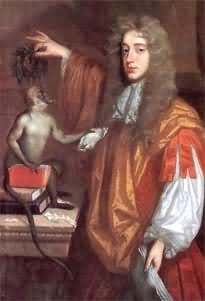
John Wilmot (1 april 1647 – 26 juli 1680)
De Duitse schrijver Carl Sternheim werd als zoon van een joodse bankier geboren op 1 april 1878 in Leipzig. Zie ook mijn blog van 1 april 2009 en ook mijn blog van 1 april 2010.
Uit: Die Hose
„Erster Auftritt
Theobald und Luise treten auf:
Theobald:
Daß ich nicht närrisch werde!
Luise:
Tu den Stock fort!
Theobald schlägt sie:
Geschändet im Maul der Nachbarn, des ganzen Viertels.
Frau Maske verliert die Hose!
Luise:
Au! Ach!
Theobald:
Auf offener Straße, vor den Augen des Königs sozusagen.
Ich, ein einfacher Beamter!
Luise schreiend:
Genug.
Theobald:
Ist nicht zu Haus Zeit Bänder zu binden, Knöpfe zu knöpfen? Unmaß, Traum, Phantasien im Leib, nach außen Liederlichkeit und Verwahrlosung.
Luise:
Ich hatte eine feste Doppelschleife gebunden.
Theobald lacht auf:
Eine feste Doppelschleife. Herrgott, hör das niederträchtige Geschnatter. Eine feste – da hast du eine feste Doppelohrfeige. Die Folgen! Ich wage nicht, zu denken.
Entehrt, aus Brot und Dienst gejagt.
Luise:
Beruhige dich.
Theobald:
– Rasend…
Luise:
Du bist unschuldig.
Theobald:
Schuldig, ein solches Weib zu haben, solchen Schlampen, Trulle, Sternguckerin.
Außer sich:
Wo ist die Welt?
Er packt sie beim Kopf und schlägt ihn auf den Tisch. Unten, im Kochtopf, auf dem mit Staub bedeckten Boden deiner Stube, nicht im Himmel, hörst du? Ist dieser Stuhl blank? Nein – Dreck! Hat diese Tasse einen Henkel? Wohin ich fasse, klafft Welt. Loch an Loch in solcher Existenz. Schauerlich!
Mensch, bedenke doch! Ein gütiges Schicksal gab mir ein Amt, das siebenhundert Taler einbringt.“
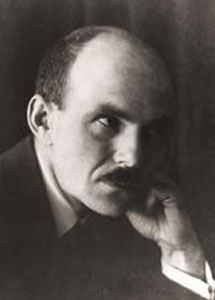
Carl Sternheim (1 april 1878 – 3 november 1942)
